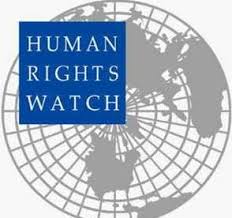Human Rights Watch is a nonprofit, nongovernmental human rights organization made up of roughly 400 staff members around the globe. Its staff consists of human rights professionals including country experts, lawyers, journalists, and academics of diverse backgrounds and nationalities. Established in 1978, Human Rights Watch is known for its accurate fact-finding, impartial reporting, effective use of media, and targeted advocacy, often in partnership with local human rights groups. Each year, Human Rights Watch publishes more than 100 reports and briefings on human rights conditions in some 90 countries, generating extensive coverage in local and international media. With the leverage this brings, Human Rights Watch meets with governments, the United Nations, regional groups like the African Union and the European Union, financial institutions, and corporations to press for changes in policy and practice that promote human rights and justice around the world.
MISSION STATEMENT
Human Rights Watch defends the rights of people worldwide. We scrupulously investigate abuses, expose the facts widely, and pressure those with power to respect rights and secure justice. Human Rights Watch is an independent, international organization that works as part of a vibrant movement to uphold human dignity and advance the cause of human rights for all.
CORE VALUES - WE ARE:
COMMITTED TO OUR MISSION OF DEFENDING HUMAN RIGHTS WORLDWIDE. Our work is guided by international human rights and humanitarian law and respect for the dignity of each human being.
INDEPENDENT. To ensure our independence, we do not accept government funds, directly or indirectly, or support from any private funder that could compromise our objectivity and independence. We do not embrace political causes, are non-partisan, and maintain neutrality in armed conflict.
FACTUAL, ACCURATE, AND ETHICAL IN OUR FACT-FINDING. We are committed to maintaining high standards of accuracy and fairness, including by seeking out multiple perspectives to develop an in- depth, analytic understanding of events. We recognize a particular responsibility for the victims and witnesses who have shared their experiences with us.
ACTIVELY FOCUSED ON IMPACT. We succeed only when our actions lead to positive and sustainable change. We are never complacent, always on the lookout for new opportunities to advance our cause. We also are committed to working on difficult situations, where long-term attention is required for meaningful impact.
SUPPORTIVE OF A DIVERSE AND VIBRANT INTERNATIONAL HUMAN RIGHTS MOVEMENT AND MUTUALLY BENEFICIAL PARTNERSHIPS. We work closely with a broad range of local and international civil society actors to maximize our impact. We speak out against attacks on civil society and defend the political space within which the broader human rights movement operates.
Members:
Resources
Displaying 16 - 20 of 20Out of Sight, Out of Mind: Thai Policy toward Burmese Refugees and Migrants
The report, Out of Sight, Out of Mind: Thai Policy toward Burmese Refugees, documents Thailand’s repression of refugees, asylum seekers, and migrant workers from Burma. "The Thai government is arresting and intimidating Burmese political activists living in Bangkok and along the Thai-Burmese border, harassing Burmese human rights and humanitarian groups, and deporting Burmese refugees, asylum seekers and others with a genuine fear of persecution in Burma..."
1. Introduction...
Double standards: women's property rights violations in Kenya
This report recounts the experiences of 130 women from various regions, ethnic groups, religions, and social classes in Kenya who have had their property rights flouted because they are women.The report presents evidence that women are excluded from inheriting, evicted from their lands and homes by in-laws, stripped of their possessions, and forced to engage in risky sexual practices in order to keep their property. When they divorce or separate from their husbands, they are often expelled from their homes with only their clothing.
Sudan, oil, and human rights
This report examines the human cost of oil, and corporate complicity in the Sudanese government’s human rights abuses. It finds that oil is an important obstacle to lasting peace in Sudan, and oil revenues have been used by the government to obtain weapons and ammunition that have enabled it to intensify the war and expand oil development.
Double Standards - Women's Property Rights Violations in Kenya
This report describes the pervasive property rights violations which women are subject in Kenya. It describes women's rights in the country more generally and focuses on how widows, daughters, divorced women and married women are discriminated against and deprived of secure access to land and other resources. The report also makes recommendations to the government of Kenya as well as to donors and international organisations.
Zimbabwe: fast track land reform in Zimbabwe
This report considers the human rights implications of the 'fast track' process of land redistribution in Zimbabwe, under which the government has revised the constitution and amended legislation in order to allow it to acquire commercial farms compulsorily and without compensation, and the land occupations that have accompanied it since early 2000.




